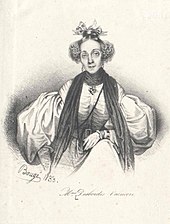Marceline Desbordes-Valmore
Marceline Desbordes-Valmore (born June 20, 1786 in Douai , † July 23, 1859 in Paris ) was a French writer .
Life
Marceline-Félicité-Josèphe Desbordes was the daughter of the successful painter Félix Desbordes and his wife Catherine Lucas. Her childhood was marked by the difficult family situation, as her father became more and more impoverished in the turmoil of the French Revolution . In order to improve the family's financial situation, her mother decided to pair her with a relative in Guadeloupe , Antilles . Marked by yellow fever , she returned at the age of 16, her mother had died of the disease.
Desbordes devoted himself to music and began a career as a singer and actress. The meeting with the Belgian-French composer André-Ernest-Modeste Grétry in 1805 brought her an engagement at the Opéra-Comique . In 1813 she moved to Odéon , and in 1815 she played at the Brussels Theater La Monnaie . At first she wrote for the stage herself, but was unsuccessful.
From 1808 to 1810 she was in an illegitimate relationship with Henri de Latouche , their child died in 1816. In their second marriage, she married the actor Prosper Lanchantin Valmore in 1817, with whom she often appeared on stage. Shaped by the failures of her stage work, she first had to be urged to publish her poems. But she already had success with her debut volume in 1819. In 1823 she turned her back on the stage and, until the end of her life, painstakingly created further volumes of poetry at several years' intervals. She had four children with Lanchantin Valmore, three of whom died while she was still alive.
Her works, especially the poems, show Desbordes-Valmore as an extraordinarily kind, sensitive woman with a big loving heart, but also with disturbing breaks in her eventful life. The subjects of her poems range from motherhood - which she is almost the only poet to tap into - to love, friendship, childhood, God and social oppression, against which she protested, e.g. B. on the occasion of the uprising of the silk weavers in Lyon in 1831/1834 . Charles Baudelaire and Paul Verlaine , drawn to the attention of Arthur Rimbaud , admired the intimacy, musicality and immediacy of their poetry. She has been called France's greatest poet in the nineteenth century.
Works (selection)
- Élégies et romances (1819, elegies and romances)
- Élégies et Poésies nouvelles (1825, elegies and new poetry)
- Poésies Inédites (1830, New Poetry)
- Les pleurs (1833, The Tears)
- Pauvres fleurs (1839, poor flowers)
- Bouquets et prières (1843, bouquets and prayers)
- Poésies inédites (1860 posthumously, unpublished poems)
Translations into German:
- Stefan Zweig , Marceline Desbordes-Valmore. The Life of a Poet (1927, contains a selection of poems, letters and autobiographical fragments)
- Marceline Desbordes-Valmore: The first love / Le premier amour . Selected poems (French / German) Vorw. U. translated by Karl Schwedhelm . ISBN 3-89086-812-6 .
- Marceline Desbordes-Valmore: Domenica. Story of a singer. Translation + epilogue: Joachim Schultz. Frankfurt / Main: Insel, 2000, ISBN 3-458-34406-3 .
literature
- Jutta Rosenkranz: “My heart is true and sincere.” Marceline Desbordes-Valmore . In: "Line by line my paradise." Eminent women writers. 18 portraits. Piper, Munich 2014 ISBN 978-3-492-30515-0
- Giorgia Sogos: Le biography di Stefan Zweig tra "History e Psychology". Firenze University Press, 2013 ISBN 978-88-6655-508-7
- Giorgia Sogos: The biography of Marceline Desbordes-Valmore: a forerunner to "Marie Antoinette" and "Maria Stuart" by Stefan Zweig . In: Stefan Zweig, the cosmopolitan. Study collection on his works and other contributions. A critical analysis. Free Pen Verlag, Bonn 2017 ISBN 978-3-945177-43-3 pp. 91-100
Web links
- Literature by and about Marceline Desbordes-Valmore in the catalog of the German National Library
- http://poesie.webnet.fr/auteurs/desborde.html some poems by Desbordes-Valmore (in French)
Individual evidence
- ↑ a b Antonius Lux (ed.): Great women of world history. A thousand biographies in words and pictures . Sebastian Lux Verlag , Munich 1963, p. 127.
| personal data | |
|---|---|
| SURNAME | Desbordes-Valmore, Marceline |
| BRIEF DESCRIPTION | French writer |
| DATE OF BIRTH | June 20, 1786 |
| PLACE OF BIRTH | Douai |
| DATE OF DEATH | July 23, 1859 |
| Place of death | Paris |

